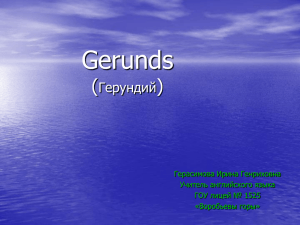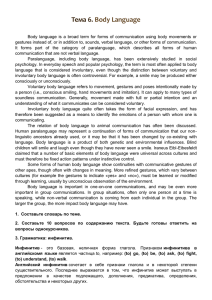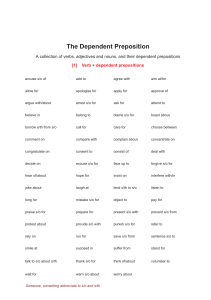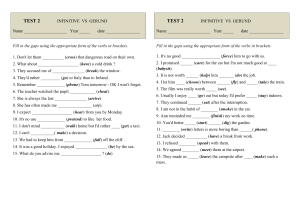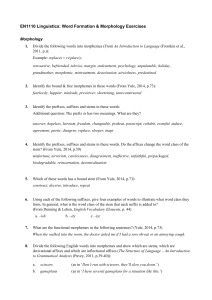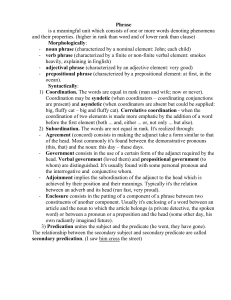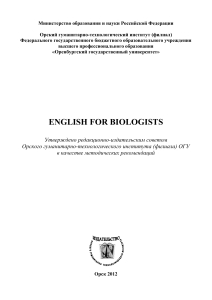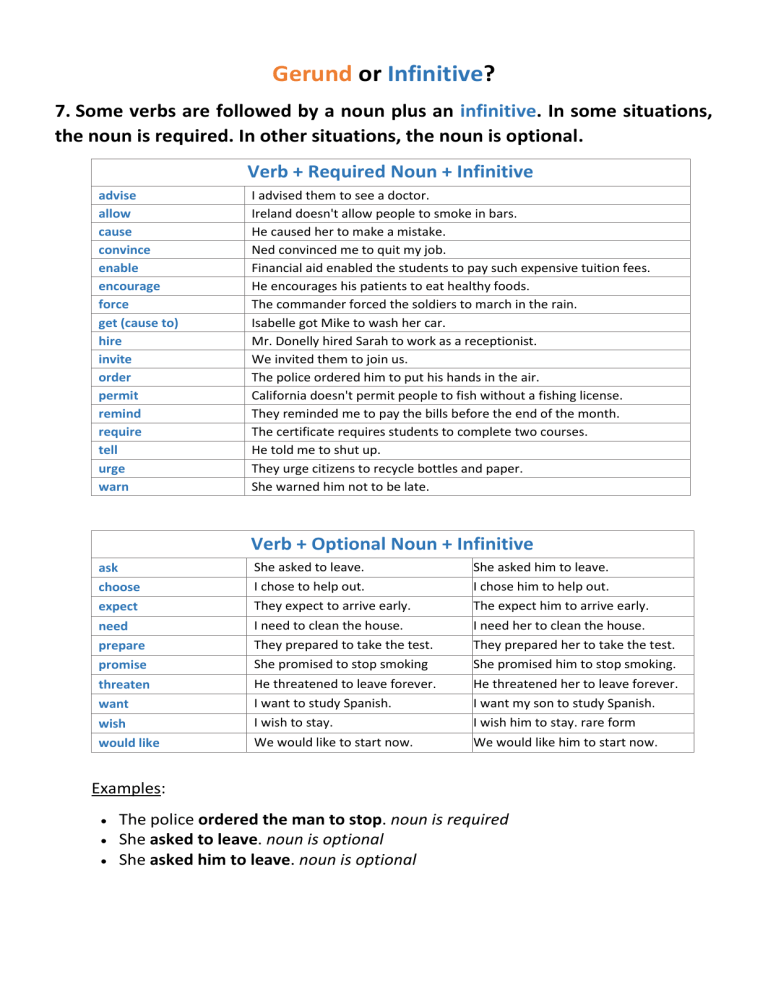
Gerund or Infinitive? 7. Some verbs are followed by a noun plus an infinitive. In some situations, the noun is required. In other situations, the noun is optional. Verb + Required Noun + Infinitive advise allow cause convince enable encourage force get (cause to) hire invite order permit remind require tell urge warn I advised them to see a doctor. Ireland doesn't allow people to smoke in bars. He caused her to make a mistake. Ned convinced me to quit my job. Financial aid enabled the students to pay such expensive tuition fees. He encourages his patients to eat healthy foods. The commander forced the soldiers to march in the rain. Isabelle got Mike to wash her car. Mr. Donelly hired Sarah to work as a receptionist. We invited them to join us. The police ordered him to put his hands in the air. California doesn't permit people to fish without a fishing license. They reminded me to pay the bills before the end of the month. The certificate requires students to complete two courses. He told me to shut up. They urge citizens to recycle bottles and paper. She warned him not to be late. Verb + Optional Noun + Infinitive ask choose expect need prepare promise threaten want wish would like She asked to leave. I chose to help out. They expect to arrive early. I need to clean the house. She asked him to leave. I chose him to help out. The expect him to arrive early. I need her to clean the house. They prepared to take the test. She promised to stop smoking They prepared her to take the test. She promised him to stop smoking. He threatened to leave forever. I want to study Spanish. I wish to stay. He threatened her to leave forever. I want my son to study Spanish. I wish him to stay. rare form We would like to start now. We would like him to start now. Examples: • • • The police ordered the man to stop. noun is required She asked to leave. noun is optional She asked him to leave. noun is optional 𝟖. Some verbs are usually followed by a gerund, BUT they can also be followed by a noun plus infinitive. Using a noun plus infinitive will usually change who is performing the action. Verbs Followed by Either Gerunds OR Nouns + Infinitives advise allow encourage permit require urge I advised seeing a doctor. Ireland doesn't allow smoking in bars. He encourages eating healthy foods. California doesn't permit fishing without a fishing license. The certificate requires completing two courses. I advised them to see a doctor. Ireland doesn't allow people to smoke in bars. He encourages his patients to eat healthy foods. California doesn't permit people to fish without a fishing license. The certificate requires students to complete two courses. They urge recycling bottles and paper. They urge citizens to recycle bottles and paper. Examples: • • I advised taking the train. in general I advised him to take the train. He will take the train. 𝟗. Gerunds can often be modified with possessive forms such as his, her, its, your, their, our, John's, Mary's, the machine's, and so on. This makes it clearer who or what is performing the action. Examples: • • • • I enjoyed their singing. They were singing. She understood his saying no to the offer. He said no. Sam resented Debbie's coming late to the dinner. Debbie came late to the dinner. We discussed the machine's being broken. The machine is broken. 𝟏𝟎. There are many "go + gerund" expressions used for adventure sports and individual recreational activities. Examples: • • I go swimming every weekend. Would you ever go skydiving? 𝟏𝟏. Gerunds are used after prepositions. Most commonly, these are "verb + preposition" combinations. You don't have to memorize these resources, you just need to remember that gerunds are used after prepositions! Examples: • • • They admitted to committing the crime. Leslie made up for forgetting my birthday. He is thinking about studying abroad. 𝟏𝟐. There are many "adjective + preposition" combinations and "noun + preposition" combinations in English as well. These are also followed by gerunds. You don't have to memorize these resources, you just need to remember that gerunds are used after prepositions! Examples: • • • • Sandy is scared of flying. adjective + preposition Nick is anxious about taking the examination. adjective + preposition His interest in becoming a professional racer was well known. noun + preposition Thomas' story about seeing a grizzly bear was really exciting. noun + preposition Adjective + Preposition Combinations Followed by Gerunds accustomed to addicted to afraid of anxious about bored of capable of committed to concerned about content with dedicated to devoted to disappointed with discouraged by excited about famous for fond of frightened of guilty of happy about interested in involved in known for opposed to proud of remembered for responsible for scared of terrified of tired from tired of worried about Noun + Preposition Combinations Followed by Gerunds addiction to advantage of anxiety about belief in credit for dedication to delay in devotion to disadvantage of experience in fear of fondness for habit of knowledge of love of memory of preference for process of reaction to reason for regret for report on reputation for responsibility for story about talent for Герундий или Инфинитив? 7. После ряда глаголов мы используем дополнение с инфинитивом. В некоторых ситуациях использование дополнения обязательно, в некоторых – необязательно. Глагол + Дополнение + Инфинитив advise (советовать) allow (разрешать) cause (вынуждать) convince (убеждать) enable (делать доступным) encourage (подбадривать) force (заставлять) get (cause to) (заставлять) hire (нанимать) invite (приглашать) order (приказывать) permit (разрешать) remind (напоминать) require (требовать) tell (рассказывать) urge (призывать) warn (предупреждать) I advised them to see a doctor. Ireland doesn't allow people to smoke in bars. He caused her to make a mistake. Ned convinced me to quit my job. Financial aid enabled the students to pay such expensive tuition fees. He encourages his patients to eat healthy foods. The commander forced the soldiers to march in the rain. Isabelle got Mike to wash her car. Mr. Donelly hired Sarah to work as a receptionist. We invited them to join us. The police ordered him to put his hands in the air. California doesn't permit people to fish without a fishing license. They reminded me to pay the bills before the end of the month. The certificate requires students to complete two courses. He told me to shut up. They urge citizens to recycle bottles and paper. She warned him not to be late. Глагол + Необязательное дополнение + Инфинитив ask (просить, спрашивать) choose (выбирать) expect (ожидать) need (нуждаться) prepare (подготавливать) promise (обещать) threaten (угрожать) want (хотеть) wish (желать) would like (хотеть) She asked to leave. I chose to help out. They expect to arrive early. I need to clean the house. They prepared to take the test. She promised to stop smoking He threatened to leave forever. She asked him to leave. I chose him to help out. The expect him to arrive early. I need her to clean the house. They prepared her to take the test. She promised him to stop smoking. He threatened her to leave forever. I want to study Spanish. I wish to stay. We would like to start now. I want my son to study Spanish. I wish him to stay. rare form We would like him to start now. Примеры: • • • The police ordered the man to stop. дополнение необходимо She asked to leave. дополнение не является обязательным She asked him to leave. дополнение не является обязательным 𝟖. После ряда глаголов обычно используется герундий, НО после этих же глаголов может использоваться связка дополнение + инфинитив. Использование дополнения с инфинитивом обычно меняет смысл предложения. Verbs Followed by Either Gerunds OR Nouns + Infinitives advise allow encourage permit require urge I advised seeing a doctor. Ireland doesn't allow smoking in bars. I advised them to see a doctor. Ireland doesn't allow people to smoke in bars. He encourages eating healthy foods. California doesn't permit fishing without a fishing license. The certificate requires completing two courses. They urge recycling bottles and paper. He encourages his patients to eat healthy foods. California doesn't permit people to fish without a fishing license. The certificate requires students to complete two courses. They urge citizens to recycle bottles and paper. Примеры: • • I advised taking the train. в целом I advised him to take the train. конкретная ситуация, он поедет на поезде 𝟗. Перед герундием часто можно встретить притяжательную форму местоимений или существительных: his, her, its, your, their, our, John's, Mary's, the machine's, и т.д. Это помогает уточнить кто/что осуществляет действие. Примеры: • • • • I enjoyed their singing. They were singing. She understood his saying no to the offer. He said no. Sam resented Debbie's coming late to the dinner. Debbie came late to the dinner. We discussed the machine's being broken. The machine is broken. 𝟏𝟎. Есть много выражений "go + герундий", используемых, когда говорим о спорте, отдыхе, каких-либо активностях. Примеры: • • I go swimming every weekend. Would you ever go skydiving? 𝟏𝟏. . Чаще всего после фразовых глаголов ("глагол + предлог") используется именно герундий, а не инфинитив. Запоминать глаголы не надо, достаточно помнить, что после предлогов используется Герундий. Примеры: • • • They admitted to committing the crime. Leslie made up for forgetting my birthday. He is thinking about studying abroad. 𝟏𝟐. Есть много сочетаний "прилагательное + предлог" и "существительное + предлог" и после них тоже надо использовать герундий. Примеры: • • • • Sandy is scared of flying. прилагательное + предлог Nick is anxious about taking the examination. прилагательное + предлог His interest in becoming a professional racer was well known. сущ. + предлог Thomas' story about seeing a grizzly bear was really exciting. сущ. + предлог Прилагательное + предлог + герундий accustomed to addicted to afraid of anxious about bored of capable of committed to concerned about content with dedicated to devoted to disappointed with discouraged by excited about famous for fond of frightened of guilty of happy about interested in involved in known for opposed to proud of remembered for responsible for scared of terrified of tired from tired of worried about Существитлеьное + предлог + герундий addiction to advantage of anxiety about belief in credit for dedication to delay in devotion to disadvantage of experience in fear of fondness for habit of knowledge of love of memory of preference for process of reaction to reason for regret for report on reputation for responsibility for story about talent for
